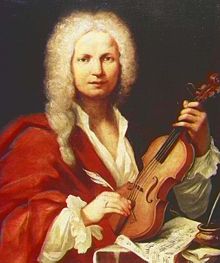- Orlando furioso (Vivaldi)
-
Antonio Vivaldi  Operas
Operas- Ottone in villa (1713)
- Orlando finto pazzo (1714)
- Nerone fatto Cesare (1715)
- Arsilda, regina di Ponto (1716)
- La costanza trionfante (1716)
- L'incoronazione di Dario (1717)
- Tieteberga (1717)
- Armida al campo d'Egitto (1718)
- Scanderbeg (1718)
- Teuzzone (1719)
- Tito Manlio (1719)
- La verità in cimento (1720)
- La Silvia (1721)
- Ercole su'l Termodonte (1723)
- Dorilla in Tempe (1726)
- Farnace (1727)
- Orlando furioso (1727)
- Argippo (1730)
- Motezuma (1733)
- L'Olimpiade (1734)
- Bajazet (1735)
- Griselda (1735)
Orlando furioso is an opera in three acts by Antonio Vivaldi to an Italian libretto by Grazio Braccioli, based on the poem of the same name by Ariosto. The first performance of the opera was at Teatro San Angelo, Venice, in 1727.
The opera – more formally, the dramma per musica – alternates arias with recitative, and is set on an island at an unspecified time. The story line combines several plot lines from Ariosto: the exploits of the hero Orlando are detailed, as well as the tale of the sorceress Alcina.
Contents
Roles
Role Character and Voice type[1] Premiere cast, 1727
(Conductor: – )Orlando a knight jealous of Medoro (contralto) Lucia Lancetti Angelica beloved of Medoro (soprano) Benedetta Serosina Alcina Enchantress (contralto) Anna Girò Bradamante female warrior, beloved of Ruggiero (contralto) Maria Catterina Negri Medoro Prince betrothed to Angelica (contralto castrato) Casimiro Pignotti Ruggiero a knight following Orlando (contralto castrato) Giovanni Andrea Tassi Astolfo bass Gaetano Pinetti Synopsis
Act 1.
In a delightful garden in which two springs are seen, Medoro escapes from a shipwreck into the arms of his beloved Angelica. Alcina magically helps Medoro and he recounts how he was first captured, then shipwrecked. Orlando is jealous of Medoro, but Angelica lies and says Medoro is her brother.
Alcina is attracted to the knight Ruggiero. She uses her magic to make him forget Bradamante and love her instead. Bradamante discovers Ruggiero's "betrayal." She shows him the ring he gave her therefore breaking Alcina's spell. Ruggiero feels guilty by his actions.
Act 2.In a grove with green secluded spots, Astolfo reflects how he loves Alcina, but is tormented by her unfaithfulness.
Meanwhile, in a mountainous alpine region with a high, precipitous cliff, Angelica and Medoro swear their love and part ways. To rid herself of Orlando, Angelica sends him to fight a monster who guards an elixir of youth.
Orlando enters a cavern and is trapped. Realizing Angelica's faithlessness, he digs his way out.
Angelica and Medoro marry in a countryside at the foot of a hill. They carve their vows on a nearby tree. Orlando finds the tree, and on reading the inscription, becomes furious that he starts destroying the trees.
Act 3.The place is at the Entrance Hall before the Temple of Hecate. Astolfo believes Orlando dead. With Ruggiero and Bradamante, he plots revenge against Alcina. The secret of Alcina's power lies in an urn, which is locked in the temple of Hecate. They await Alcina's return.
Inside the temple of Hecate, Bradamante disguises herself as a man. Alcina falls in love with her. Orlando, still raving mad about the marriage of Angelica and Medoro, fights with the temple statues, inadvertently destroying Alcina's power.
In a deserted island. Alcina tries to attack the sleeping Orlando, but is prevented by Ruggiero and Bradamante. Astolfo returns to arrest Alcina. Orlando regains his reason and forgives Angelica and Medoro.
Recordings
- 1978: Marilyn Horne, Victoria de los Ángeles, Lucia Valentini Terrani, Carmen Gonzales, Sesto Bruscantini, Nicola Zaccaria;
I Solisti Veneti, Claudio Scimone; Erato - 2004: Marie-Nicole Lemieux, Jennifer Larmore, Veronica Cangemi, Ann Hallenberg, Philippe Jaroussky, Lorenzo Regazzo;
Ensemble Matheus; Jean-Christophe Spinosi; Naïve OP30393 - 2008: Anne Desler, Nicki Kennedy, Marianna De Liso, Luca Dordolo;
Coro da Camera Italiano; Modo Antiquo, Federico Maria Sardelli. CPO
References
- ^ Eric Cross. "Orlando furioso", Grove Music Online, ed. L. Macy (accessed 7 August 2007), grovemusic.com (subscription access).
External links
Categories:- Italian-language operas
- Matter of France
- Operas by Antonio Vivaldi
- 1727 operas
- Operas
- Operas based on works by Ludovico Ariosto
- Italian-language opera stubs
Wikimedia Foundation. 2010.
